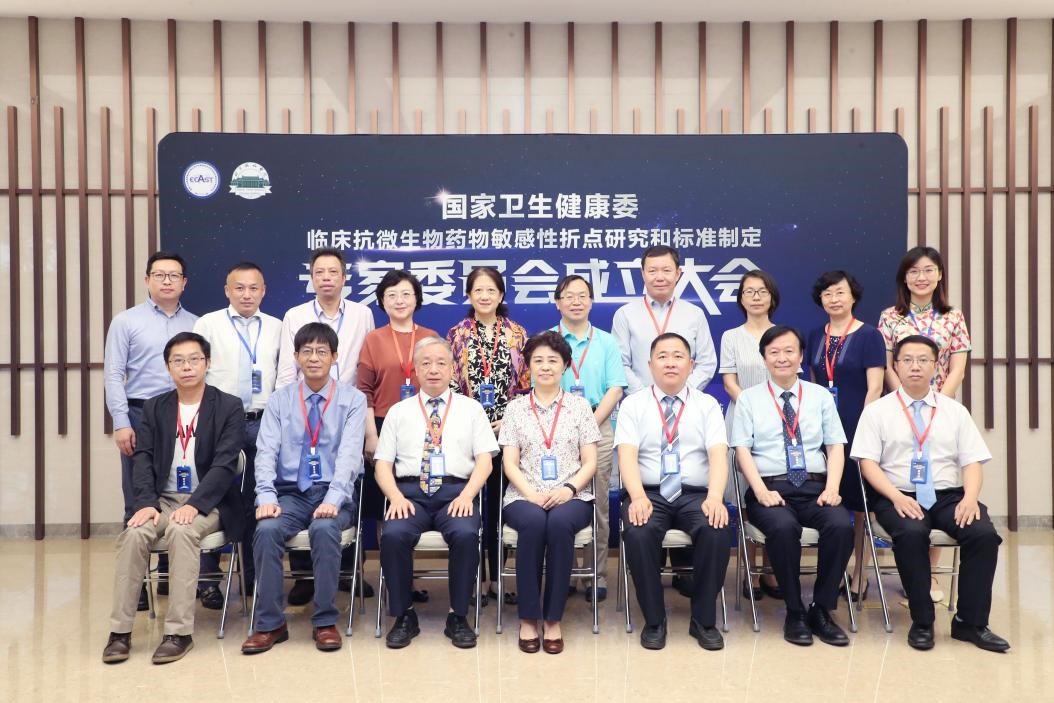On August 6, 2022, the inaugural meeting of the Expert Committee on Clinical Antimicrobial Susceptibility Breakpoint Research and Standard Development, the National Health Commission (hereinafter referred to as “National Antimicrobial Susceptibility Committee”), was held at Peking Union Medical College Hospital (PUMCH), marking the official launch of the research and development of the Chinese standard for clinical antimicrobial susceptibility breakpoints. A new book named Application Tools for the Antimicrobial Susceptibility Testing System, the European Committee on Antimicrobial Susceptibility Testing (EUCAST), was also released during the meeting.
Antimicrobial susceptibility breakpoint is an important reference for defining clinical pathogenic microrganism as “resistant”, “susceptible” or “intermediate” to antimicrobials. At present, there are two major standards on susceptibility worldwide, namely, the EUCAST standard in Europe and Clinical & Laboratory Standards Institute (CLSI) standard in the U.S. However, due to the differences in pharmacokinetics among different populations, preferences in drug usage and dose, and variations of susceptibility patterns in different geographic areas, the interpretation of antimicrobial susceptibility test values by European and American standards may result in deviations in China. What’s more, there is no established standard to refer to for the new Class I antimicrobial drugs China developed independently. In September 2021, the National Health Commission entrusted PUMCH to organize experts nationwide in relevant fields to engage in research and formulation of Chinese standard for clinical antimicrobial susceptibility breakpoints.
It was announced at the meeting that academician Shang Hong of the First Hospital of China Medical University and academician Jiang Jiandong of the Institute of Medical Biotechnology, the Chinese Academy of Medical Sciences were appointed as academic advisors of the National Antimicrobial Susceptibility Committee. Zhang Shuyang, the President of PUMCH, was appointed as the honorary director and Xu Yingchun, the director of the Department of Clinical Laboratory of PUMCH, was appointed as the director. Li Dachuan, the Deputy Director of the Bureau of Medical Administration of the National Health Commission, said that the National Antimicrobial Susceptibility Committee should factor in both common clinical problems and susceptibility breakpoint research methods and establish a sound Chinese breakpoint system to better guide clinical drug selection. PUMCH should actively participate in the global antimicrobial drug resistance management work, and come up with a Chinese solution for it.
Over the years, the Department of Clinical Laboratory, PUMCH has been committed to the research on antimicrobial susceptibility breakpoints. It led the establishment of the Chinese Committee on Antimicrobial Susceptibility Testing (ChiCAST) in 2017 and has carried out a series of studies on test methodology, breakpoint localization and standardization, etc. ChiCAST has led and completed the epidemiological breakpoint study for the domestic antimicrobial drugs norvancomycin and sitafloxacin hydrate, the results of which have been included in the official website database of EUCAST. This is the earliest, multi-center epidemiological breakpoint study of antimicrobial drugs completed independently in China according to international standard. The newly established National Antimicrobial Susceptibility Committee will be in a better position to organize the experts in clinical microbiology, clinical pharmacology and clinical infectious diseases to jointly facilitate the research and formulation concerning antimicrobial susceptibility breakpoints standard.

Group picture of guests at the main forum
Reporter: Fu Tanping
Correspondent: Wang Tong
Picture courtesy: The Department of Clinical Laboratory
Translator: Liu Haiyan
Editor: Zhao Ying and Wang Yao
